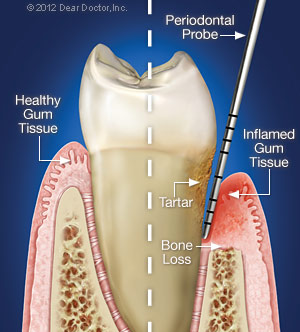When To See A Periodontist
Gum Disease May Require A Specialist's Care
Dear Doctor,
I think I may have gum disease. Should I see a periodontist?

Dear Mary,
Good question. As you may already know, a periodontist (“peri” – around; “odont” – tooth) is a dentist who specializes in the gum, bone and connective tissues that surround and support your teeth — in short, everything that attaches your teeth to you. All periodontists undertake at least three extra years of advanced studies after graduating from dental school. They are experts in the diagnosis and treatment of all disorders and diseases of the supporting structures of the teeth, as well as periodontal medicine and dental implant tooth replacement systems.
Periodontal (gum) disease is a broad term for a group of different diseases, all of which have the same outcome: loss of attachment of the gum, connecting tissues and bone to the teeth. Most periodontal diseases are caused by the bacterial biofilm that collects around the teeth in the absence of effective daily oral hygiene, and the way the body's immune (resistance) system reacts to it. Today, periodontal medicine encompasses how periodontal disease and systemic (general body) disease impact each other. In addition, recent studies have reported that almost fifty percent of the adult US population (about 65 million people) has destructive periodontal disease, which begs the question:
How Do You Know You Have Periodontal (Gum) Disease?
You can have a beautiful smile but beneath it, you could be losing periodontal attachment, i.e. bone that supports the teeth. Gum disease is generally asymptomatic — silent. Early warning signs may be slight bleeding when you brush or floss, slight redness and inflammation of the gum margins, bad taste or breath — or you may not notice anything. Later symptoms and consequences that you will recognize include abscesses, loose or moving teeth, and ultimately tooth loss.
The treatment of periodontal diseases depends upon their cause so accurate diagnosis beginning with a comprehensive periodontal evaluation is crucial. Most early to moderate periodontal diseases have some common treatment objectives: Instructing you in achieving optimum daily biofilm (plaque) control at home with brushing and flossing, and making sure you receive a thorough professional teeth cleaning — known as scaling and root planing, or root debridement — at the dental office. More significant moderate to advanced disease may also include occlusal (bite) treatment and/or surgical treatment.
Can a general dentist do all these things or do you need to see a specialist?
All general dentists are educated and trained to treat early forms of gum disease. Some take extra training to learn the skills required to treat more advanced forms of disease. Periodontists work hand in hand with general dentists and other dental specialists to diagnose and manage periodontal and other dental problems as part of a team approach.

If you have a periodontal concern, a good place to start is your general or family dentist, who will refer you to a periodontal specialist if he or she feels that your condition warrants it, or if your treatment needs are beyond the scope of that particular general dental practice. Any general dentist who treats periodontal gum disease must treat to the same standards as a periodontist, so if you are accepted for treatment, you should be in good hands.
If you have already seen a general dentist, or a periodontist for that matter, and you would like a second opinion, then you should see a periodontist of your choice, or by recommendation. You do not have to be referred to a periodontist to see one for an opinion. It is helpful if you have your previous dental and medical records available; your past history can have a bearing on your current condition and treatment. If you are uncomfortable asking for these records, the periodontist you select can request them.
If you are concerned that you may have advanced periodontal disease or you already have systemic disease such as diabetes (an inability to metabolize sugar) or cardiovascular disease (“cardio” – heart; “vascular” – blood vessel), you may consider seeing a periodontist straight away. If you see a periodontist, and have no general dentist, it is likely that he/she will refer you to one for other dental care.
You can also go to the American Academy of Periodontology website www.perio.org for more information. See a general dentist or periodontist about your periodontal condition; better advice can be given about your specific concerns once you are seen and have been examined. I wish you the very best of luck.




